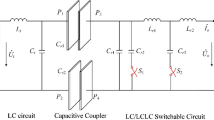Abstract
Focusing on the output voltage reduction caused by variation of the equivalent coupling capacitance in capacitive power transfer (CPT) system, this paper proposes a hybrid control strategy to achieve constant output voltage with the variation. The hybrid automata model is introduced for the cascaded CPT system considering the characteristics of higher order, nonlinear, multi-mode, continuous time and discrete states. The control process of the system is transformed into a selection of boundary transition conditions, which simplify the controller design and implementation. Then, a hybrid automata model of the system is established based on the theory of hybrid system, and the boundary transition of each mode of the system is given. The simulation and experimental results show that the proposed hybrid control strategy can keep the output voltage constant when the coupling capacitance of CPT system varies in a certain range.










Similar content being viewed by others
References
Su Y, Chen L, Wu Xu, Hu AP, Tang C, Dai X (2018) Load and mutual inductance identification from the primary side of inductive power transfer system with parallel-tuned secondary power pickup. IEEE Trans Power Electron 33(11):9952–9962. https://doi.org/10.1109/TPEL.2018.2793854
Ge X-J, Sun Y, Wang Z-H, Tang C-S (2019) A single-source switched-capacitor multilevel inverter for magnetic coupling wireless power transfer systems. Electr Eng 101(4):1083–1094. https://doi.org/10.1007/s00202-019-00850-5
Sun Y, Yan P, Wang Z, Luan Y (2016) The parallel transmission of power and data with the shared channel for an inductive power transfer system. IEEE Trans Power Electron 31(8):5495–5502
KiFrivaldsky M, Piri M, Spanik P, Jaros V, Kondelova A (2017) Peak efficiency and peak power point operation of wireless energy transfer (WET) system—analysis and verification. Electr Eng 99(4):1439–1451. https://doi.org/10.1007/s0020201706584
Yugang S, Lingzhi C, Chunsen T, Junhao Ma, Aiguo H (2016) Evolutionary multi-objective optimization of PID parameters for output voltage regulation in CPT system based on NSGA-II. Trans China Electrotech Soc 31(19):106–114. https://doi.org/10.3969/j.issn.1000-6753.2016.19.010
Huang Liang H, Patrick A, Kumar SA, Yugang S (2016) Z-impedance compensation for wireless power transfer based on electric field. IEEE Trans Power Electron 31(11):7556–7563. https://doi.org/10.1109/TPEL.2016.2557461
Yugang S, Shiyun X, Chunsen T, Long C, Xueying W (2018) An electric-field coupled power transfer system with constant voltage output based on T-Π mixed resonant circuit. Trans China Electrotech Soc 33(8):1685–1695. https://doi.org/10.19595/j.cnki.1000-6753.tces.162009
Wu X, Su Y, Hou X, Qing X, Dai X (2019) Study on load adaptation of capacitive power transfer system with a four-plate compact capacitive coupler. Electr Eng 101(3):733–742. https://doi.org/10.1007/s00202-019-00820-x
Liu C, Hu AP, Nair NKC (2011) Modelling and analysis of a capacitively coupled contactless power transfer system. IET Power Electron 4(7):808–815. https://doi.org/10.1049/iet-pel.2010.0243
Yugang S, Zhao Yuming H, Patrick A, Zhihui W, ChunSen T, Yue S (2019) An F-type compensated capacitive power transfer system allowing for sudden change of pick-up. IEEE J Emerg Select Topics Power Electron 7(2):1084–1093. https://doi.org/10.1109/JESTPE.2018.2859423
Gang Z, Min T, Yonghua S (2004) Research on hybrid systems: a survey. Control Decis 19(1):7–11. https://doi.org/10.1517/21678707.2014.931222
Hao M, Feng Q, Ni Z (2007) Modeling and control for DC-DC converters based on hybrid system. Proc CSEE 27(36):92–96. https://doi.org/10.3321/j.issn:0258-8013.2007.36.017
Xuesheng Z, Chunwen L, Yuanjie R (2009) Hybrid dynamic modeling and model predictive control for DC/AC converter. Tran China Electrotech Soc 24(7):87–92. https://doi.org/10.3321/j.issn:1000-6753.2009.07.016
Quan Y (2014) A study of control methods for DC − DC converters based on hybrid automata model, PhD thesis. South China University of Technology Guangzhou, China
Sreekumar C, Agarwal V (2008) A hybrid control algorithm for voltage regulation in DC-DC boost converter. IEEE Trans Industr Electron 55(6):2530–2538. https://doi.org/10.1109/TIE.2008.918640
Senesky M, Eirea G, Koo TJ (2003) Hybrid modeling and control of power electronics. In: Computation & Control, Germany, pp 450–465. https://doi.org/10.1007/3-540-36580-X_33
Alur R, Dill D (1994) A theory of timed automata. Theoret Comput Sci 126(2):183–235. https://doi.org/10.1016/0304-3975(94)90010-8
Tang C, Shen H, Li X (2015) Modeling and analyzing of quasi-resonant converter based on hybrid automata. Trans China ElectrotechSoc 30(8):120–126
Acknowledgements
This work was supported by the research funds for the National Natural Science Foundation of China under Grants 51977015.
Author information
Authors and Affiliations
Corresponding author
Additional information
Publisher's Note
Springer Nature remains neutral with regard to jurisdictional claims in published maps and institutional affiliations.
Rights and permissions
About this article
Cite this article
Su, Y., Wang, Z., Zhao, Y. et al. Hybrid control of capacitive power transfer system for coupling capacitance variation. Electr Eng 102, 2245–2253 (2020). https://doi.org/10.1007/s00202-020-01025-3
Received:
Accepted:
Published:
Issue Date:
DOI: https://doi.org/10.1007/s00202-020-01025-3




